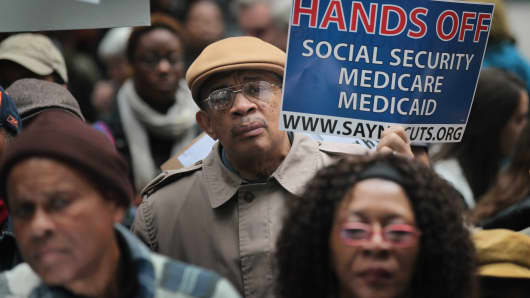Proposed changes to the way Social Security benefits are paid—part of President Barack Obama's plan to help balance the budget—will lower what seniors receive at a time they can least afford it, said Robert Frank, professor of economics at Cornell University's Johnson Graduate School of Management.
"It's hard to see this as humane," Frank said. "Seniors are facing hardships economically with cost-of-living increases, especially in health care."
What's on the table from Obama is a revised adjustment in cost-of-living formulations. The new measurement is called "chained CPI."
(Read More: Chained CPI: What It Is and How It Will Affect You)
It would differ from the current consumer price index by assuming that if prices for one item rise, people will buy a different one—say, chicken instead of beef. The current CPI adjusts inflation only if consumers buy a cheaper variety of the same item, say a Gala apple for $1.25 a pound instead of a Fuji for $2.25 a pound.
According to critics, the new formula would produce lower estimates for cost-of-living increases for the 55 million current Social Security recipients—as well as future retirees—and reduce benefits.
(Read More: Firms Mislead Workers on 401(k) Rollovers: GAO)
A poll from AARP showed that 87 percent of seniors contacted were against the refashioned inflation measurement stick.
One big reason for concern is seniors' health care outlays. They spend two and a half times as much as other age groups, according to the Congressional Research Service.
Insurance premiums continue to rise much faster than the 2 percent rate of overall inflation. In 2011, average premiums rose 8 percent for individuals and 9 percent for family coverage, according to the Kaiser Family Foundation.
"If anything, the chained CPi underestimates the amount of inflation," Frank said. "With higher medical costs and a lack of real pension plans for seniors, they are at a major disadvantage."
The National Women's Law Center said chained CPI would be particularly onerous for women. Thirteen percent of women between 65 and 69 rely on Social Security for all their income, versus 10 percent of men, according to the center.
(Read More: You Go Girl! Time to 'Lean In' on Finances: Study)
"Because women live longer than men and are more dependent on Social Security, this change to chained CPI will produce serious hardship on women," the center said in a recent study. "Women face an increasingly insecure retirement."
The current average Social Security payment is about $1,230 a month, and the rate of cost-of-living increases from inflation for Social Security benefits (known as COLA) is 1.7 percent. The Bureau of Labor Statistics estimates that the cuts from chained CIP for those who retire now at 65 would be 3.7 percent by the time they reach 75—about $4,600. Cuts would be 6.5 percent for those reaching the age of 85 and 9.2 percent for anyone who reaches 95.
Some view the chained CPI positively.
(Read More: Post-Recession Americans Saving More, Risking Less)
"I think it's a better way to measure inflation and won't be devastating," said Peter McHenry, an assistant professor of economics at William & Mary College.
"The impact would be very small," McHenry said. "For some people it might be a concern, but overall, I think people would be able to adjust to it."
Timothy Nash, professor of economics at Northwood University, said that the revision "may be more accurate, but it will likely hurt" seniors more. "Seniors could also get hit by higher taxes if we index tax brackets to chained CPI," he said.
"Seniors would be getting less money from benefits and having to pay more taxes if the new CPI comes out lower," Nash added. "It would actually increase the tax burden for seniors by saying inflation is not as high as it may actually be, while not lowering tax rates."
Social Security payments represent the sole income source for about 35 percent of people over 65. Approximately 3 out of 4 Americans start claiming Social Security benefits as soon as they are eligible, at 62. Most do that out of necessity, according to the American Association of Baby Boomers.
Whether the chained CPI will make it into a final budget agreement is uncertain. Many Democratic lawmakers say it should be removed from any budget discussions. Republicans contend that, like Medicare, Social Security is broken, contributes to the national debt and must be reformed.
Just this past weekend, the president called his budget proposal to cut the deficit "not the ideal plan" but said it offers "tough reforms to the nation's entitlement programs while closing tax loopholes for the wealthy."
"We do need to fix Social Security so there's enough money in the decades to come," Frank said. "But this idea of a chained CPI isn't the best one. With more people retiring every day, it's hard to see how this helps them."



